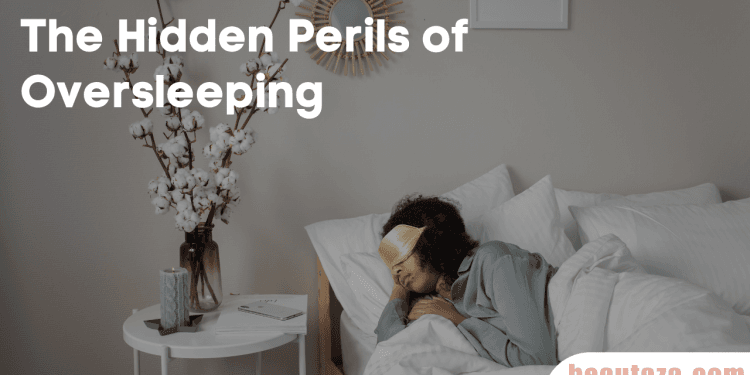
I will discuss The Hidden Perils of Oversleeping in this blog post. In a world that often glorifies busy schedules and sleep deprivation, oversleeping might appear to be a luxury – a cherished opportunity to catch up on lost rest. After all, who wouldn’t relish spending a few extra hours cocooned in the comforting embrace of a soft mattress? However, beneath the surface of this seemingly idyllic scenario lies a reality that deserves closer scrutiny.
Sleep is undoubtedly a cornerstone of a healthy and balanced life, and its benefits are well-documented – from rejuvenating the body to enhancing cognitive functions. But, as with many things in life, moderation is key. The allure of oversleeping, often painted as an indulgent escape from the demands of the day, can harbor a range of potential disadvantages that extend beyond the boundaries of the cozy haven of your bed.
The Illusion of Luxury: Debunking the Oversleeping Myth
In a world that perpetually hustles and bustles, such moments of tranquility appear to be the epitome of luxury. Oversleeping, often associated with these leisurely mornings, has become synonymous with relaxation and pampering oneself. However, it’s time to unveil the truth behind this seemingly lavish indulgence.
Contrary to the popular notion, oversleeping isn’t a one-way ticket to a rejuvenated and invigorated self. While our culture may romanticize the idea of prolonged slumber, the reality is far more complex. Our bodies operate on a finely tuned internal clock called the circadian rhythm. This rhythm orchestrates our sleep-wake cycles and helps regulate various physiological processes.
Though it might seem like a cherished luxury, oversleeping can send these delicate rhythms into disarray. Instead of feeling refreshed and ready to conquer the day, you might find yourself battling a sense of grogginess long after peeling yourself out of bed. This is because oversleeping can disrupt the natural ebb and flow of our sleep patterns, leading to a phenomenon known as “sleep drunkenness.”
Imagine waking up in the middle of a dream, your mind still entangled in the world of slumber while the demands of the waking world pull you in the opposite direction. This is the disorienting experience that can accompany oversleeping – a far cry from the luxurious and tranquil morning you might have envisioned.
Beyond the immediate cognitive fog, oversleeping can have a domino effect your entire day. Those extra hours of sleep might set you on a collision course with missed appointments, late arrivals, and a general sense of unproductivity. Far from the image of luxury we associate with it, oversleeping can lead to a cascade of missed opportunities and strained relationships, leaving you feeling more lethargic than revitalized.
Disrupting the Body Clock: The Role of Circadian Rhythms
In the intricate symphony of our bodies, a conductor orchestrates our daily routines – the circadian rhythm. This internal timekeeper ensures that our sleep-wake cycles, hormone production, and various physiological processes dance harmoniously. Yet, when the enchantment of oversleeping enters the stage, this delicate ballet can be thrown into disarray, disrupting the body clock and leaving us stumbling through the performance of our lives.
Circadian rhythms, often called our “body clock,” are the biological mechanisms that regulate our sleep patterns, alertness, and bodily functions over a 24-hour cycle. Imagine these rhythms as the sun and moon of our internal universe, casting their light and shadow to guide us seamlessly from the energy of daytime to the restfulness of night. However, oversleeping can be like altering the position of these cosmic bodies, casting us into a realm of confusion and imbalance.
When we indulge in excessive sleep, the body’s internal clock is bombarded with conflicting signals. Instead of the graceful transition from slumber to wakefulness, we find ourselves caught between two worlds – one of lingering dreams and another of pressing responsibilities. This phenomenon, known as “sleep inertia,” can leave us feeling sluggish, disoriented, and struggling to shake off the remnants of sleep.
But the role of circadian rhythms extends beyond mere sleepiness. These rhythms are pivotal in regulating mood, cognitive functions, and hormone production. When oversleeping becomes a habit, it can throw off this intricate balance, leading to mood swings, impaired memory, and reduced cognitive sharpness. Imagine navigating life’s complex maze with a foggy map – oversleeping can cast such a haze over our mental faculties.
Health Consequences of Excessive Sleep
In sleep, balance is the key that unlocks the door to optimal health and well-being. While the value of quality sleep is undeniable, falling into the tempting embrace of excessive slumber can lead to unforeseen health consequences. As we navigate this territory, it becomes evident that the allure of oversleeping is a deceptive mirage, concealing a range of potential risks that can cast a shadow over our physical and mental vitality.
A. Physical Health
- Weight Gain and Obesity: The connection between oversleeping and weight gain is not a tale spun from thin air. Research suggests that individuals who consistently oversleep individuals may be more likely to become overweight or obese. This link can be attributed to reduced physical activity, disrupted metabolism, and altered appetite-regulating hormones.
- Diabetes and Heart Health: The intricate dance of hormones and bodily processes is disrupted when excessive sleep becomes a routine. Studies have hinted at a correlation between prolonged sleep and an increased risk of diabetes and cardiovascular diseases. These risks stem from the disturbance of insulin sensitivity, inflammation, and blood pressure regulation.
- Headaches and Body Aches: Surprisingly, indulging in too much sleep might not lead to waking up pain-free. Oversleeping has been associated with heightened pain sensitivity and increased susceptibility to headaches, body aches, and discomfort. This physical toll contradicts the notion of oversleeping as a remedy for bodily fatigue.
B. Mental Health
- Depression and Anxiety: Just like the body, the mind thrives on balance and routine. Excessive sleep can disrupt the equilibrium of neurotransmitters and hormones, potentially exacerbating symptoms of depression and anxiety. Rather than providing shelter from emotional storms, oversleeping can amplify their intensity.
- Cognitive Impairment: The mental realm is not impervious to the effects of oversleeping. Memory lapses, difficulty concentrating, and reduced mental sharpness can be unwelcome companions for those who routinely oversleep. Much like a well-tuned instrument, the brain requires consistent care and use to maintain its optimal functioning.
- Mood Swings and Emotional Instability: Far from offering a sanctuary of tranquility, excessive sleep can lead to mood swings, irritability, and emotional instability. The disruption of circadian rhythms and hormonal imbalances can leave individuals feeling emotionally adrift, struggling to find their footing in the ebb and flow of daily life.
Creating a Healthy Sleep Routine
1. Embrace Consistency: Consistency is the lighthouse guiding us through stormy sleep disturbances. Set a regular sleep schedule by going to bed and waking up at the same time every day, even on weekends. This reinforces your body’s internal clock, promoting a more harmonious sleep-wake cycle.
2. Design a Sleep-Conducive Environment: Craft a sanctuary of slumber by creating a comfortable and soothing sleep environment. Dim the lights, reduce noise, and ensure your mattress and pillows provide the proper support for a restful night’s sleep.
3. Prioritize Physical Activity: Regular physical activity can promote better sleep quality. However, exercise should be done earlier in the day, as strenuous workouts close to bedtime can hinder your ability to fall asleep.
4. Limit Screen Time Before Bed: The glow of screens can disrupt the production of the sleep-inducing hormone melatonin. Aim to reduce screen time at least an hour before bedtime to allow your body to wind down naturally.
5. Mindful Consumption: Be mindful of what you eat and drink incredibly close to bedtime. Avoid heavy, spicy, or acidic foods, caffeine, and alcohol, as they can interfere with sleep.
6. Establish a Pre-Sleep Routine: Engage in relaxing activities before bedtime to signal your body that it’s time to wind down. This could include reading a book, practicing deep breathing, or enjoying a warm bath.
7. Sunlight Exposure: Exposure to natural light during the day helps regulate your body’s internal clock. Spend time outdoors, especially in the morning, to help anchor your sleep-wake cycle.
Read More –













